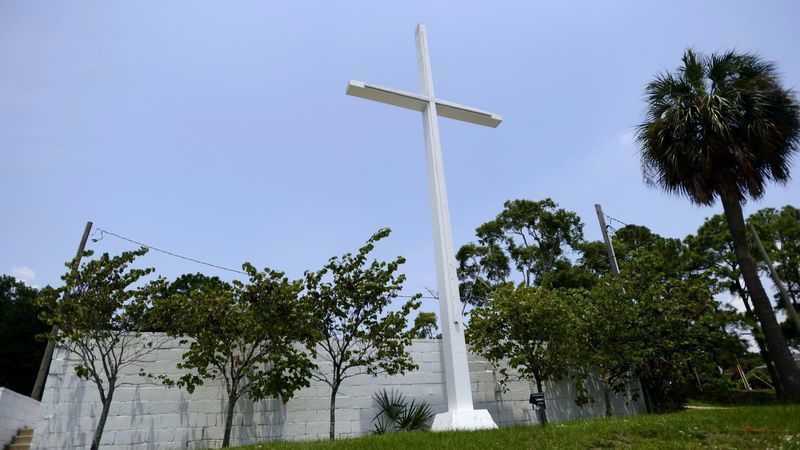US Supreme Court Orders Lower Court to Revisit Florida Cross Ruling Following Decision Upholding Maryland Cross

WASHINGTON — The U.S. Supreme Court has wiped out a lower court ruling that found a Florida cross monument unconstitutional and has instructed the court to revisit the case in light of SCOTUS’ other ruling last week upholding a similar cross display.
“The judgment is vacated, and the case is remanded to the United States Court of Appeals for the Eleventh Circuit for further consideration in light of American Legion v. American Humanist Assn.,” the court simply wrote on Friday.
As previously reported, last September, a three-judge panel with the 11th Circuit Court of Appeals did not want to uphold the ordered removal of the Bayview cross, but said they were regretfully “bound by existing circuit precedent.” Two of the three judges acknowledged that they were uncomfortable with the result and remarked that the “Supreme Court’s Establishment Clause jurisprudence is a wreck.”
They asked that the full circuit overturn its own precedent.
“Good law — stare decisis — sometimes leads good judges to follow bad law and write the wrong order. That happened in this case,” lamented Judge C. Ashley Royal.
He said that Christianity was woven into the very fabric of early America, and that modern society has difficulty understanding that aspect of history.
Royal provided an extensive history of America’s beginnings, including the Puritans’ desire for a land where they could escape conformity to the Roman Catholic Church and worship God in the purity of the early Church.
He explained the controversies that arose as other denominations — such as Baptists, Quakers and Congregationalists — came into the picture, and it soon became apparent through disagreement over doctrine that men needed to call for “religious toleration” as there couldn’t be one particular national church.
That is, the government wasn’t going to establish the Baptist, or Puritan, or Congregational denomination as being the official church of the nation. It couldn’t choose one over the other.
Men needed to be free to serve God according to the dictates of their consciences; they needed freedom of religion.
“Religious toleration, therefore, was for everyone, and the federal government could not establish a national church. This protected religious freedom in the new country. But state governments could be involved in religion, and ‘separation’ only operated at the national level,” Royal noted.
CASE HISTORY
The case began in 2016 when the American Humanist Association (AHA) and the Freedom From Religion Foundation (FFRF) sued the City of Pensacola on behalf of four local residents who asserted that the cross violates the separation of church and state.
The groups had written to city officials to request that the display be removed, but their demands were rejected. Therefore, they took the matter to the courts.
“Mr. Kondrat’yev’s use and enjoyment of the local park is impeded by the Bayview Cross,” the legal complaint read, citing plaintiff Andreiy Kondrat’yev. “He feels a sense of peace and tranquility at the Bayview Park, but feels that is overshadowed by a religious symbol that signifies torture and violence to him.”
Kondrat’yev and his wife, who was also a plaintiff in the case, have since moved to Canada since becoming involved in the suit.
David Suhor, an atheist who delivered an invocation to Satan at the Pensacola city hall in 2016, was additionally one of the complainants in the legal challenge.
“Mr. Suhor objects to the government’s display of the Christian cross because he believes it is an endorsement of Christianity, placed primarily for religious purposes, including aggrandizing Easter Sunday services,” the filing read. “As a non-Christian, Mr. Suhor is personally offended and feels excluded by this governmental message. He opposes this appearance of governmental favoritism for religion and for a particular religion, Christianity.”
In June 2017, U.S. District Court Judge Roger Vinson ruled that the cross must come down, although reluctantly. He outlined that he believes there is a difference between the original intent of the Founding Fathers regarding the Establishment Clause and the various case law that he felt bound to follow. He said that the cross would be deemed legal if viewed through the lens of what the nation’s founders intended.
“[H]ow is the Bayview Cross supposed to be analyzed? By applying [the] Lemon [standard]; one of the other tests; or no formal test at all?” he wrote. “May I look to what the Founding Fathers intended (in which case the cross is certainly constitutional), or must I look to how the ‘wall of separation’ metaphor has been applied (in which case it is probably unconstitutional)?”
SUPREME COURT REMAND

On June 20, the U.S. Supreme Court acknowledged in the Bladensburg case that there are “shortcomings” with the Lemon standard, which are based on the 1971 ruling of Lemon v. Kurtzman.
“It could not ‘explain the Establishment Clause’s tolerance, for example, of the prayers that open legislative meetings, . . . certain references to, and invocations of, the Deity in the public words of public officials; the public references to God on coins, decrees, and buildings; or the attention paid to the religious objectives of certain holidays, including Thanksgiving,” explained Justice Samuel Alito on behalf of the 7-2 majority.
“The test has been harshly criticized by members of this court, lamented by lower court judges, and questioned by a diverse roster of scholars,” Alito noted.
He also pointed to other monuments that have been upheld by the court that are of both a religious and secular nature, such as the Texas Ten Commandments monument in Orden v. Perry.
“For believing Jews and Christians, the Ten Commandments are the word of God handed down to Moses on Mount Sinai, but the image of the Ten Commandments has also been used to convey other meanings. They have historical significance as one of the foundations of our legal system, and for largely that reason, they are depicted in the marble frieze in our courtroom and in other prominent public buildings in our nation’s capital,” Alito exemplified.
He further noted, “Religion undoubtedly motivated those who named Bethlehem, Pennsylvania; Las Cruces, New Mexico; Providence, Rhode Island; Corpus Christi, Texas; Nephi, Utah, and the countless other places in our country with names that are rooted in religion. Yet few would argue that this history requires that these names be erased from the map.”
The court then concluded of the Bladensburg cross case — a monument that erected in 1925 by The American Legion to honor the lives of 49 men from Prince George County who died during World War I:
“The cross is undoubtedly a Christian symbol, but that fact should not blind us to everything else that the Bladensburg Cross has come to to represent. For some, that monument is a symbolic resting place for ancestors who never returned home. For others, it is a place for the community to gather and honor all veterans and their sacrifices for our nation. For others still, it is a historical landmark.”
“For many of these people, destroying or defacing the cross that has stood undisturbed for nearly a century would not be neutral and would not further the ideals of respect and tolerance embodied in the First Amendment. For all these reasons, the cross does not
offend the Constitution.”
In tending to an appeal in the Pensacola cross case, also known as the Bayview cross, the court has now consequently asked the 11th Circuit Court of Appeals to revisit its ruling in light of the Bladensburg decision.
“We remain confident in our legal position given the still firmly settled precedent finding religious displays maintained for exclusively religious purposes unconstitutional,” Monica Miller, senior counsel for the American Humanist Association, said in a statement. “The Bladensburg cross decision does not impact the decades of Supreme Court precedent holding government action motivated by a religious purpose unconstitutional.”
However, the religious liberties group Becket said that it is confident that the 11th Circuit will rule that the cross can stay upon remand.
“The Supreme Court’s order is an encouraging sign that the Bayview cross can stay in Pensacola just like the Peace Cross can stay in Maryland,” remarked Luke Goodrich, vice president and senior counsel at Becket. “We fully expect the lower court to follow the Supreme Court’s lead.”
Become a Christian News Network Supporter…

 Dear Reader, has ChristianNews.net been of benefit and a blessing to you? For many years now, the Lord has seen fit to use this small news outlet as a strong influential resource in keeping Christians informed on current events from a Biblical worldview. With much compromise and many falsehoods in modern-day Christianity, we strive to bring you the news by keeping Christ and His word in focus. If you have benefited from our news coverage, would you please prayerfully consider becoming a Christian News supporter by clicking here to make a one-time or monthly donation to help keep the truth of God’s word widely and freely published and distributed? May Christ continue to be exalted through this work!
Dear Reader, has ChristianNews.net been of benefit and a blessing to you? For many years now, the Lord has seen fit to use this small news outlet as a strong influential resource in keeping Christians informed on current events from a Biblical worldview. With much compromise and many falsehoods in modern-day Christianity, we strive to bring you the news by keeping Christ and His word in focus. If you have benefited from our news coverage, would you please prayerfully consider becoming a Christian News supporter by clicking here to make a one-time or monthly donation to help keep the truth of God’s word widely and freely published and distributed? May Christ continue to be exalted through this work!





Comments are closed.